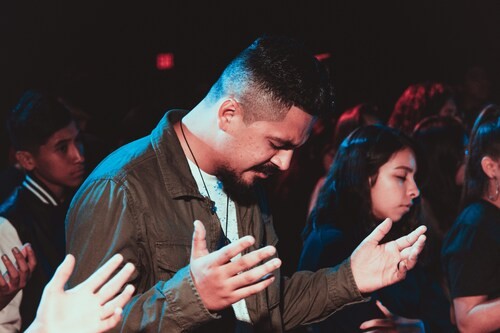

Week 1 Bible Study
Surprised by Grace
Warm Up
1. Tell us about a wonderful gift your parents gave you as a child, or a loved one has
given you as an adult.
Study
Read John 1:1-5
2. The Apostle John grew up by the shores of the Sea of Galilee. He was a small-town boy, you attended synagogue school, but never college, nor anything as academic as our high school. He learned the fishing trade from his father, and then, at around age 13 or 14, Jesus called him to become a disciple. John wrote this description of Jesus sixty years later. What happened in John's life that developed his understanding to the point
where he could write this?
3. If all you knew about Jesus came from this single paragraph, what would you know
about Him? Make a list:
Read John 1:14-18
4. What's the difference between "grace" and "truth" (v. 14)? Why are these two qualities
so important to Jesus' nature?
5. In what way or ways have “we all received grace upon grace from his fullness” (v. 16)?
Read Exodus 33:12 - 34:1-7
6. Why does Moses want to know God’s ways (v. 12) and have God’s presence with him
(v. 15)?
7. Instead of showing Moses God’s glory (v. 18), God shows him His goodness (v. 19).
How is God’s goodness related to His “name”?
Read Matthew 2:9-10
8. According to vs. 5-7, what is God (“the Father”) really like?
9. Compare and contrast Moses’ description of the Father and John’s description of the
Son. What do they have in common, and how do they differ?
10. How important is grace to the nature of God the Father and God the Son?
11. In your learning this week, what has surprised you about God, and/or about grace?
Application
12. Our second day's reading suggested we memorize Ex. 34:6-7. How's that going for you? Are there ways we can help each other with it?
13. How do you hope or plan to live differently due to these 30 Days of Grace?
Share requests and pray for each other.
1. Tell us about a wonderful gift your parents gave you as a child, or a loved one has
given you as an adult.
Study
Read John 1:1-5
2. The Apostle John grew up by the shores of the Sea of Galilee. He was a small-town boy, you attended synagogue school, but never college, nor anything as academic as our high school. He learned the fishing trade from his father, and then, at around age 13 or 14, Jesus called him to become a disciple. John wrote this description of Jesus sixty years later. What happened in John's life that developed his understanding to the point
where he could write this?
3. If all you knew about Jesus came from this single paragraph, what would you know
about Him? Make a list:
Read John 1:14-18
4. What's the difference between "grace" and "truth" (v. 14)? Why are these two qualities
so important to Jesus' nature?
5. In what way or ways have “we all received grace upon grace from his fullness” (v. 16)?
Read Exodus 33:12 - 34:1-7
6. Why does Moses want to know God’s ways (v. 12) and have God’s presence with him
(v. 15)?
7. Instead of showing Moses God’s glory (v. 18), God shows him His goodness (v. 19).
How is God’s goodness related to His “name”?
Read Matthew 2:9-10
8. According to vs. 5-7, what is God (“the Father”) really like?
9. Compare and contrast Moses’ description of the Father and John’s description of the
Son. What do they have in common, and how do they differ?
10. How important is grace to the nature of God the Father and God the Son?
11. In your learning this week, what has surprised you about God, and/or about grace?
Application
12. Our second day's reading suggested we memorize Ex. 34:6-7. How's that going for you? Are there ways we can help each other with it?
13. How do you hope or plan to live differently due to these 30 Days of Grace?
Share requests and pray for each other.

Week 2 Bible Study
Motivated by Grace
Warm Up
Read 2 Corinthians 5:17-18
1. Tell us a few of the ways Jesus has changed you since you’ve become a Christian.
2. What does “everything is from him” (2 Cor. 5:18) really mean?
Study
Read P1 Corinthians 15:9-10
3. Why was Paul so grateful, and what did it motivate him to do?
4. How should we respond to God’s forgiveness and grace?
Read Psalm 66:10-12
5. What kind of circumstances do you think this Psalmist is talking about? What
happened to the people of Israel that caused him to write this Psalm?
Read Psalm 66:13-17
6. How many ways did the Psalmist respond to God's rescue, and what were they?
7. Tell us about a time when you felt like this Psalmist.
Read Titus 2:11-13
8. According to Paul, what has God’s grace brought us, and what is it instructing us to
do?
9. C.S. Lewis wrote, “The real Son of God is at your side. He is beginning to turn you
into the same kind of thing as Himself. He is beginning, so to speak to “inject” His kind
of life and thought,… into you; beginning to turn the tin soldier into a live man. The
part of you that does not like it is the part that is still tin.” (C.S. Lewis, Mere
Christianity, 1964, p. 162.) What has this process looked like, and felt like, in you?
Application
10. What is the greatest lesson, or lessons you've learned this week, and what do you want to do as a result?
Share requests and pray for each other.
Read 2 Corinthians 5:17-18
1. Tell us a few of the ways Jesus has changed you since you’ve become a Christian.
2. What does “everything is from him” (2 Cor. 5:18) really mean?
Study
Read P1 Corinthians 15:9-10
3. Why was Paul so grateful, and what did it motivate him to do?
4. How should we respond to God’s forgiveness and grace?
Read Psalm 66:10-12
5. What kind of circumstances do you think this Psalmist is talking about? What
happened to the people of Israel that caused him to write this Psalm?
Read Psalm 66:13-17
6. How many ways did the Psalmist respond to God's rescue, and what were they?
7. Tell us about a time when you felt like this Psalmist.
Read Titus 2:11-13
8. According to Paul, what has God’s grace brought us, and what is it instructing us to
do?
9. C.S. Lewis wrote, “The real Son of God is at your side. He is beginning to turn you
into the same kind of thing as Himself. He is beginning, so to speak to “inject” His kind
of life and thought,… into you; beginning to turn the tin soldier into a live man. The
part of you that does not like it is the part that is still tin.” (C.S. Lewis, Mere
Christianity, 1964, p. 162.) What has this process looked like, and felt like, in you?
Application
10. What is the greatest lesson, or lessons you've learned this week, and what do you want to do as a result?
Share requests and pray for each other.

Week 3 Bible Study
Sustained by Grace
Warm Up
1. How have your thoughts about grace changed since we began our 30 Days together?
Study
Read Isaiah 40:28-31
2. In this week's reading on this passage, we noted that the normal order of movement is to walk, then run, and then soar. God, through Isaiah, reverses the order here. Bible scholars believe it's to draw our attention to the difference between our expectations and God's actions. When we are hurting, we want to fly over our problems. We want instantaneous, supernatural relief. If we can't have that, we at least want to run through our problems with some kind of supernatural strength that makes our mountain feel like a molehill. The last thing we want is to have to endure the problem day after burdensome day, like we're walking through peanut butter.
God sees things differently. He views pain as an opportunity for our faith and character to grow. Therefore, He rarely performs a miracle that will stunt our growth, or shrink our problem if it will shrink our growth. His normal, loving response to our pain is to walk beside us, encouraging and cheering us step by step and day after day until we learn what there is to be learned, or increase our faith by trusting Him in spite of no relief.
Talk about this as a group. What have you experienced during recent trials? And how is understanding God’s perspective helpful to you?
Read 2 Cor. 12:7b-9
3. What was Paul's experience with suffering and with Sustaining Grace? What choice did he make as he dealt with his "thorn in the flesh"?
4. Is there something in Paul’s example you’d like to learn from or imitate?
Read 2 Peter 2:1
5. Is it possible to have grace “multiplied”? If so, how does it/can it happen? If not, what
is Peter saying here?
6. One way grace can increase in a person’s life is by becoming more aware of it. Has
that been happening for you over these last two weeks?
7. Another way grace can increase is in a person's awareness of the Lord's presence with
them, minute by minute. Has that been happening for you over the last two weeks?
Read Psalm 90:1-6
8. What is Moses saying here about God’s nature and human nature?
Read Psalm 90:7-12
9. According to v. 12, what’s the solution to our dilemma? How does that relate to
becoming increasingly aware of God’s grace and presence?
Read Psalm 90:17
10. What part of your life’s efforts would you like to have God establish deeply enough
that it lasts beyond your lifetime?
Application
11. What is the great lesson, or lessons you’ve learned this week, and what do you want to do as a result?
Share requests and pray for each other.
1. How have your thoughts about grace changed since we began our 30 Days together?
Study
Read Isaiah 40:28-31
2. In this week's reading on this passage, we noted that the normal order of movement is to walk, then run, and then soar. God, through Isaiah, reverses the order here. Bible scholars believe it's to draw our attention to the difference between our expectations and God's actions. When we are hurting, we want to fly over our problems. We want instantaneous, supernatural relief. If we can't have that, we at least want to run through our problems with some kind of supernatural strength that makes our mountain feel like a molehill. The last thing we want is to have to endure the problem day after burdensome day, like we're walking through peanut butter.
God sees things differently. He views pain as an opportunity for our faith and character to grow. Therefore, He rarely performs a miracle that will stunt our growth, or shrink our problem if it will shrink our growth. His normal, loving response to our pain is to walk beside us, encouraging and cheering us step by step and day after day until we learn what there is to be learned, or increase our faith by trusting Him in spite of no relief.
Talk about this as a group. What have you experienced during recent trials? And how is understanding God’s perspective helpful to you?
Read 2 Cor. 12:7b-9
3. What was Paul's experience with suffering and with Sustaining Grace? What choice did he make as he dealt with his "thorn in the flesh"?
4. Is there something in Paul’s example you’d like to learn from or imitate?
Read 2 Peter 2:1
5. Is it possible to have grace “multiplied”? If so, how does it/can it happen? If not, what
is Peter saying here?
6. One way grace can increase in a person’s life is by becoming more aware of it. Has
that been happening for you over these last two weeks?
7. Another way grace can increase is in a person's awareness of the Lord's presence with
them, minute by minute. Has that been happening for you over the last two weeks?
Read Psalm 90:1-6
8. What is Moses saying here about God’s nature and human nature?
Read Psalm 90:7-12
9. According to v. 12, what’s the solution to our dilemma? How does that relate to
becoming increasingly aware of God’s grace and presence?
Read Psalm 90:17
10. What part of your life’s efforts would you like to have God establish deeply enough
that it lasts beyond your lifetime?
Application
11. What is the great lesson, or lessons you’ve learned this week, and what do you want to do as a result?
Share requests and pray for each other.

Week 4 Bible Study
Giving Grace
Warm Up
1. Who do you most enjoy giving to, and why?
Study
Read 1 Samuel 22:1-2 & Psalm 133
2. What do you suppose David learned and experienced in the cave that shaped his writing of Psalm 133?
3. How is living together with people you really get along with like the anointing of the king (Ps. 133:2)? And how is it like moisture that waters the earth (Ps. 133:3)?
Read Hebrews 3:12-14
4. How does frequent encouragement help ward off an unbelieving heart (v. 12)?
5. Tell us about a recent time when someone encouraged you. How did it make you feel?
6. It could be that the greatest long-term way to change our world is to encourage today's children. Is there a child in your life you could encourage this week? What might you say to them, or do for them, that could make a long-term impression?
Read 1 Peter 4:10
7. Do you know what your top spiritual gift is? If so, what is it, and how do you use it to build up God’s church? (If you don’t know what it is, let other members of the group speak into what they think it might be.)
Read Matthew 6:12-14
8. Why is it so hard to forgive?
9. How does a lack of forgiveness hurt the one withholding it?
10. List some of the ways God has forgiven people (maybe even you), or what people usually seek forgiveness for.
Read Ephesians 4:29-32
11. What is the easiest part of this passage for you to put into practice?
12. What’s the hardest part, and why?
Application
13. What is the most important lesson you’ve learned from our reading and/or study this week?
Share requests and pray for each other.
1. Who do you most enjoy giving to, and why?
Study
Read 1 Samuel 22:1-2 & Psalm 133
2. What do you suppose David learned and experienced in the cave that shaped his writing of Psalm 133?
3. How is living together with people you really get along with like the anointing of the king (Ps. 133:2)? And how is it like moisture that waters the earth (Ps. 133:3)?
Read Hebrews 3:12-14
4. How does frequent encouragement help ward off an unbelieving heart (v. 12)?
5. Tell us about a recent time when someone encouraged you. How did it make you feel?
6. It could be that the greatest long-term way to change our world is to encourage today's children. Is there a child in your life you could encourage this week? What might you say to them, or do for them, that could make a long-term impression?
Read 1 Peter 4:10
7. Do you know what your top spiritual gift is? If so, what is it, and how do you use it to build up God’s church? (If you don’t know what it is, let other members of the group speak into what they think it might be.)
Read Matthew 6:12-14
8. Why is it so hard to forgive?
9. How does a lack of forgiveness hurt the one withholding it?
10. List some of the ways God has forgiven people (maybe even you), or what people usually seek forgiveness for.
Read Ephesians 4:29-32
11. What is the easiest part of this passage for you to put into practice?
12. What’s the hardest part, and why?
Application
13. What is the most important lesson you’ve learned from our reading and/or study this week?
Share requests and pray for each other.

Week 5 Bible Study
Receiving Grace
Warm Up
1. What’s the best gift you ever received at Christmas?
2. What’s the best gift you’re still hoping to receive?
Study
Jesus said, “It is more blessed to give than to receive” (Acts 20:35). Yet there are times when it feels really good to receive something from somebody who wants to help you or compliment you. In this week’s readings, we noted that when it comes to receiving from other people, sometimes you have to put yourself in a position to receive.
Read Genesis 41:57-42:13; 42:23-36; 43:1-8; 45:1-11
3. What would have happened to the brothers if they had never gone to Egypt to get grain? What would have happened if they hadn’t gone back the second time?
4. Sometimes you have to put yourself in a position to receive grace from others, physically. Make a list together of physical/material things you have to be near in order to receive. (For instance, in most cases, you have to be near a business in order to work for it and get a paycheck. You have to live near your Life Group members in order for them to help when you have to move from one house to another.)
5. What keeps people from moving when moving would be good for them?
Read Ecclesiastes 7:5-6
6. What sometimes keeps people from receiving a needed rebuke?
Read Romans 12:3 & Psalm 139:13-14
7. How are we supposed to think about ourselves?
8. What difference does it make how we think about ourselves?
Read 2 Corinthians 9:6-11 & Luke 6:38
9. What is God’s promise about tithing?
10. What keeps people from tithing?
Application
11. What have you received from God during these 30 Days?
12. What have you received from the members of this group during these 30 Days?
Share requests and pray for each other.
1. What’s the best gift you ever received at Christmas?
2. What’s the best gift you’re still hoping to receive?
Study
Jesus said, “It is more blessed to give than to receive” (Acts 20:35). Yet there are times when it feels really good to receive something from somebody who wants to help you or compliment you. In this week’s readings, we noted that when it comes to receiving from other people, sometimes you have to put yourself in a position to receive.
Read Genesis 41:57-42:13; 42:23-36; 43:1-8; 45:1-11
3. What would have happened to the brothers if they had never gone to Egypt to get grain? What would have happened if they hadn’t gone back the second time?
4. Sometimes you have to put yourself in a position to receive grace from others, physically. Make a list together of physical/material things you have to be near in order to receive. (For instance, in most cases, you have to be near a business in order to work for it and get a paycheck. You have to live near your Life Group members in order for them to help when you have to move from one house to another.)
5. What keeps people from moving when moving would be good for them?
Read Ecclesiastes 7:5-6
6. What sometimes keeps people from receiving a needed rebuke?
Read Romans 12:3 & Psalm 139:13-14
7. How are we supposed to think about ourselves?
8. What difference does it make how we think about ourselves?
Read 2 Corinthians 9:6-11 & Luke 6:38
9. What is God’s promise about tithing?
10. What keeps people from tithing?
Application
11. What have you received from God during these 30 Days?
12. What have you received from the members of this group during these 30 Days?
Share requests and pray for each other.
